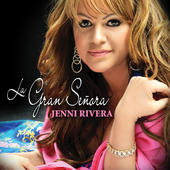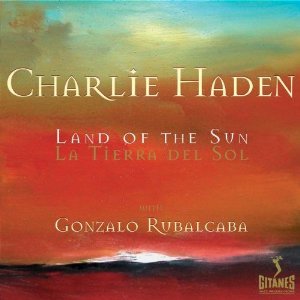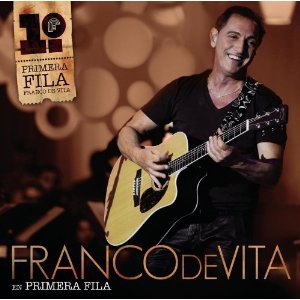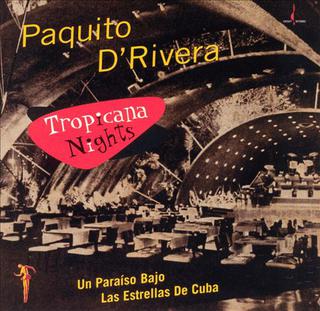
Charles Edward Haden was an American jazz double bass player, bandleader, composer and educator whose career spanned more than fifty years. Haden helped to revolutionize the harmonic concept of bass playing in jazz, evolving a style that sometimes complemented the soloist, and other times moved independently, liberating bassists from a strictly accompanying role.

Gonzalo Rubalcaba is a Cuban jazz pianist and composer.
Ignacio Berroa is a jazz drummer.

La Gran Señora is the tenth major label studio album by regional Mexican singer Jenni Rivera, released on December 1, 2009, by Fonovisa Records. It has sold 112,000 copies in the United States as of November 2011. It was named the best-selling Regional Mexican Album of 2010 by Billboard.

Land of the Sun is an album by American jazz musician Charlie Haden with Cuban pianist Gonzalo Rubalcaba. It presents orchestral Latin dance music from 1940s Mexico, mainly composed by José Sabre Marroquín, which Rubalcaba arranged for an ensemble of ten featuring among others Joe Lovano and Miguel Zenon on saxophone. In 2005, the album won Haden the Grammy Award for Best Latin Jazz Album.

Nocturne is an album by jazz musician Charlie Haden, released through Universal/Polygram in 2001. In 2002, the album won Haden the Grammy Award for Best Latin Jazz Album.
The Latin Grammy Award for Best Latin Jazz/Jazz Album is an honor presented annually at the Latin Grammy Awards, a ceremony that recognizes excellence and creates a wider awareness of cultural diversity and contributions of Latin recording artists in the United States and internationally. The award has been given to artists since the 1st Latin Grammy Awards in 2000 for vocal or instrumental albums containing more than half of its playing time of newly recorded material in Spanish or Portuguese. Latin jazz is a mixture of musical genres, including Afro-Caribbean and Pan-American rhythms with the harmonic structure of jazz. Other jazz genres may also be considered for inclusion by the Jazz Committee.

A Time for Love is a studio album by Cuban performer Arturo Sandoval. It was released by Concord Records on May 11, 2010. The album was produced by Jorge Calandrelli and Gregg Field and features collaborations by Chris Botti, Kenny Barron and Monica Mancini.

En Primera Fila is the third live album by Venezuelan recording artist Franco De Vita. It was released by Sony Music on May 31, 2011, after a three-year gap since the release of De Vita's last studio album. De Vita worked as producer with David Cabrera. The album is part of the live albums series entitled Primera Fila, promoted by the record label and including De Vita's greatest hits on re-worked versions and new songs.

The Montreal Tapes: with Gonzalo Rubalcaba and Paul Motian is a live album by the American jazz bassist Charlie Haden with pianist Gonzalo Rubalcaba and drummer Paul Motian recorded in 1989 and released on Verve Records.
"Inolvidable" ("Unforgettable") is a song written by Julio Gutiérrez in 1944. It is considered one of the most popular boleros released during the Cuban musical movement led by pianists. The song has been recorded by several performers, including Roberto Carlos, Diego El Cigala, Fania All-Stars, Eydie Gormé, Danny Rivera, Tito Rodríguez and Bebo Valdés, among others.

Pursuit of Radical Rhapsody is an album by Italian-American jazz fusion and Latin jazz guitarist Al Di Meola, released in 2011.
The 5th Lo Nuestro Awards ceremony, presented by the Univision and Billboard magazine, honored the best Latin music of 1992 and 1993 and took place on May 20, 1993, at a live presentation held at the James L. Knight Center in Miami, Florida. The ceremony was broadcast in the United States and Latin America by Univision.

Tropicana Nights is a studio album released by the Cuban jazz performer Paquito D'Rivera on November 11, 2008. The album earned D'Rivera the Latin Grammy Award for Best Latin Jazz Album in 2000.

Supernova is a studio album by The Gonzalo Rubalcaba Trio released by Blue Note Records on July 17, 2001. The trio consisted of Gonzalo Rubalcaba on piano, bassist Carlos Henríquez, and drummer Ignacio Berroa. It peaked at number 25 in the Billboard Top Jazz Albums chart.

Brazilian Dreams is a live album by Cuban jazz performer Paquito D'Rivera. It was recorded at the Manchester Craftsmen's Guild in Pittsburgh, Pennsylvania, between April 26 and 29, 2001, and released by MCG Jazz on August 27, 2002. The album features guest performances by the American vocal group New York Voices and trumpeter Claudio Roditi. In the United States, it peaked at number 22 on Billboard's Top Jazz Albums chart.

Panamericana Suite is a live album by Cuban jazz performer Paquito D'Rivera. It was released by MCG Jazz on November 2, 2010. The album was produced by Jay and Marty Ashby, and features eight songs performed with several guest performers such as Brenda Feliciano, Dave Samuels and Diego Urcola, among others. Recorded live at the Manchester Craftsmen's Guild in Pittsburgh, Pennsylvania, in April 2008, the album earned the Latin Grammy Award for Best Latin Jazz Album.
Julio Bagué is a producer, arranger and music executive. Bagué has received multiple Latin Grammy Award nominations, and won a Latin Grammy Award for Best Traditional Tropical Album for his work with Jon Secada featuring The Charlie Sepúlveda Big Band on the recording To Beny Moré with Love. Bagué is also known for signing, developing and promoting Latin music artists internationally in his capacity as a vice president of US Latin East Coast and Puerto Rico for peermusic. Bagué has been with this independent, multi-national music publishing firm for nearly two decades.

Suite Caminos is a 2015 album by Gonzalo Rubalcaba. It earned Rubalcaba a Grammy Award nomination for Best Latin Jazz Album. The album contains "an eight-section recitative scored for alto saxophone, tenor saxophone, trumpet, guitar, bass and drums, a coro of Miami-based Yoruba practitioners, and [... Rubalcaba] on piano, synths and organ."














